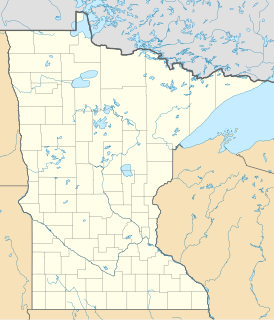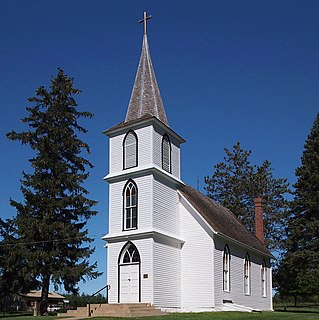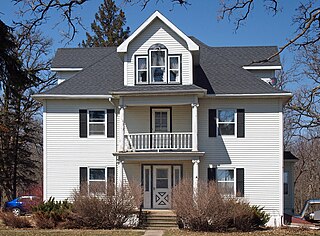
Eric Norelius was a Swedish-American Lutheran minister, church leader, and author.
The Augustana Evangelical Lutheran Church was a Lutheran church body in the United States that was one of the churches that merged into the Lutheran Church in America (LCA) in 1962. It had its roots among the Swedish immigrants in the 19th century.

The Swedish Evangelical Lutheran Church is a historic property in Anoka County, Minnesota. It is located at 2332 Swedish Drive in Ham Lake, Minnesota. The Late Victorian style church was built in 1872 to the design of architect Per August Gustafson. The church is listed on the National Register of Historic Places. The church is owned and maintained by the congregation of Our Savior's Lutheran Church of East Bethel, Minnesota and is also known as Our Saviors Lutheran Church of Ham Lake. Both churches are affiliated with the Evangelical Lutheran Church in America.
Chisago Lakes is an area of Chisago County, Minnesota along Highway 8. The Chisago Lakes Area Chamber of Commerce includes the combined areas of Shafer, Center City, Chisago City, and Lindström.

Almelund is an unincorporated community in Amador Township, Chisago County, Minnesota, United States.

Christdala Evangelical Swedish Lutheran Church is a historic church located in Forest Township, Rice County, Minnesota. It is situated 11 miles (18 km) west of Northfield at 4695 Millersburg Blvd.

The Gethsemane Evangelical Lutheran Church is a church located at 4461 Twenty-Eighth Street in Detroit, Michigan. It was designated a Michigan State Historic Site in 1980 and listed on the National Register of Historic Places in 1982. The building now houses the Motor City Missionary Baptist Church.
The Swedish American Farmsteads of Porter County, Indiana are representative of the numerous rural communities settled by a significant ethnic population. They influenced the religious community and social community. This collection is the most complete early 20th century complex within the Swedish cultural landscape of Baileytown and has retained a great deal of integrity.

St. John's Evangelical Lutheran German Church and Cemetery, also known as St. John's Lutheran Church and Cemetery and as White Church, is located in the vicinity of Hayes Center in Hayes County, Nebraska. It was listed on the National Register of Historic Places in 1985. The listing includes a 10 acres (4.0 ha) area with the church as a contributing building and the cemetery as a contributing site.

Augustana Lutheran Church is an Evangelical Lutheran Church in America congregation located in Sioux City, Iowa, United States. The church building was listed on the National Register of Historic Places in 2006 as Swedish Evangelical Lutheran Augustana Church.

Gran Evangelical Lutheran Church is a historic church in Popple Township, Clearwater County, Minnesota. Gran Church in Clearwater County is situated near the junction of Clearwater County Road 45 and 20 outside Bagley, Minnesota.

Hauge Lutheran Church is a historic church in Kenyon Township, Goodhue County, Minnesota.

Holden Lutheran Church Parsonage is a historic church parsonage at Kenyon in Wanamingo Township, Goodhue County, Minnesota. The building is located on the north side of Goodhue County Highway 8. The building was added to the National Register in 1980.

The Swedish Evangelical Lutheran Church is a historic church building in Millville, Minnesota, United States. It was built in 1874 and used successively by Swedish, Norwegian, and German immigrant congregations. The church and its adjacent cemetery were listed on the National Register of Historic Places in 1989 for having local significance in the theme of European ethnic heritage. It was nominated for being the only intact surviving ethnic church from the peak of European immigration to Wabasha County.

Marysville Swedesburg Lutheran Church is a historic church in Marysville Township, Minnesota, United States, built in 1891. It was listed on the National Register of Historic Places in 1979 for having local significance in the themes of architecture, exploration/settlement, and religion. It was nominated as one of Wright County's finest examples of a brick Gothic Revival parish church and for its association with the area's Swedish immigrants.

Swedish Evangelical Lutheran Church, now known as Swedesburg Evangelical Lutheran Church, is a historic church located in Swedesburg, Iowa, United States. The congregation was officially organized in 1866 by the Swedish Lutheran congregation from New Sweden in Jefferson County, Iowa. The present church was built in 1928 as the third church to stand on the same site. The first frame church, built in 1868, was destroyed in a fire in 1883. The second frame church, with a 110-foot (34 m) tower, was completed the same year. In 1927 it too was also destroyed by fire. The congregation hired Burlington, Iowa architect W.F. Weibley to design the present Late Gothic Revival church building. It is composed of tan brick with Bedford stone trim. The church was added to the National Register of Historic Places in 1999.

The Lutheran Minnesota Conference was one of the 13 conferences of the Augustana Evangelical Lutheran Synod. Formed by Swedish immigrants in the 1800s, it originally encompassed Minnesota, parts of North Dakota, South Dakota, Canada, and Wisconsin. Its size was substantially reduced years later when Alexandria, Fargo, and Red River Districts became the Red River Valley Conference in 1912, and the Alberta District and Canada Mission field became the Canada Conference in 1913. With the creation of the Lutheran Church in America (LCA) in 1962, it became known as the Minnesota Synod.
Peter Carlson was a Swedish-American Lutheran Minister who helped found the Augustana Evangelical Lutheran Synod and served as president of the Minnesota Conference for six years.
Andrew Jackson was a Swedish-American Lutheran minister who served as president of the Minnesota Conference of the Augustana Evangelical Lutheran Church.

Trinity Lutheran Church, also known as St. Edward's Catholic Church, is a historic church building located in Henning, Minnesota, United States. The Lutheran congregation was established in 1878. The brick Gothic Revival church was built in 1898. The twin spires on top of the central tower is a unique feature of the building. It was also one of the first structures built in town. Two other Lutheran congregations were founded in the area in the late 19th-century, Norderhaug Norwegian Evangelical Lutheran Church in 1887, and United Lutheran Church in 1896. Those two congregations merged in 1957 and Trinity joined them ten years later, forming Good Shepherd Lutheran Church. St. Edward's Catholic Church acquired the Trinity church building shortly after that. They moved to a new building in 2002 and sold the old church.


















